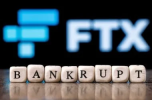- Date
- 14 December 2022
Is the jig up for Sam Bankman-Fried?
Is the jig up for Sam Bankman-Fried?
By Jake Rickman Image credit - Sergei Elagin / Shutterstock.com |
What do you need to know this week?
In the aftermath of crypto-exchange platform FTX’s spectacular blow-up last month, astounded analysts looked down on FTX’s woeful balance sheet and wondered: Was the group’s historic collapse owed to a profound management cockup, attributed to youthful negligence, or was it something more criminal?
In the intervening weeks, the disgraced former wunderkind and FTX founder Sam Bankman-Fried embarked on an unusual public campaign, giving interviews to all that would listen, cloyingly apologising to FTX’s clients and investors for the group’s insolvency which, as analysts forecast, likely means clients will lose the vast majority of the assets they entrusted to FTX to manage.
In his public appeals, SBF, as he is known, sought to affect an admission that he had gotten in over his head he failed to exercise the reasonable care and skill expected of a figure many viewed as the next Warren Buffet. Negligence and vanity, perhaps, but he intended to assure the public that the collapse was not due to criminal activity. In his own words, “I didn’t ever try to commit fraud on anyone”.
The United States Securities and Exchange Commission — the federal entity that investigates and prosecutes the majority of financial crime — evidently is not at all convinced by SBF’s public accounts.
On Monday evening, police in the Bahamas, where SBF is a resident, arrested him at his private home in response to alerts from the SEC that they intended to unseal an indictment against him. On Tuesday morning, the SEC unsealed the indictment (which you can read for yourself) and announced it was charging SBF with a series of federal felonies including defrauding investors.
The SEC’s decision to charge SBF happened nearly one year after a jury found Elizabeth Holmes guilty of defrauding investors. She was sentenced in November to 11 years in federal prison.
Why is this important for your interviews?
Across a few previous TCLA commercial articles, we have examined what FTX’s collapse means for the corporate lawyers advising all the relevant counter-parties and how it differs from other insolvencies.
The SEC’s announcement formally signals that working out FTX’s books will require insolvency practitioners and legal advisers to contend with a distinctly criminal element (as is all too common in sudden corporate collapses).
When senior management is engaged in criminal activity, it widens the scope of the workout because the law unsurprisingly takes a punitive view of corporate fraud. Certain creditors may now have a stronger claim to SBF’s (and any implicated associates’) creditors.
Separately, SBF will almost certainly obtain a white-collar criminal defence lawyer, as is his right.
How is this topic relevant to law firms?
Kirkland Ellis, who is also advising crypto-lender BlockFi in its bankruptcy filings, is serving as FTX’s principal adviser.
There is no word yet on which firm SBF has instructed to advise his personal criminal defence.

